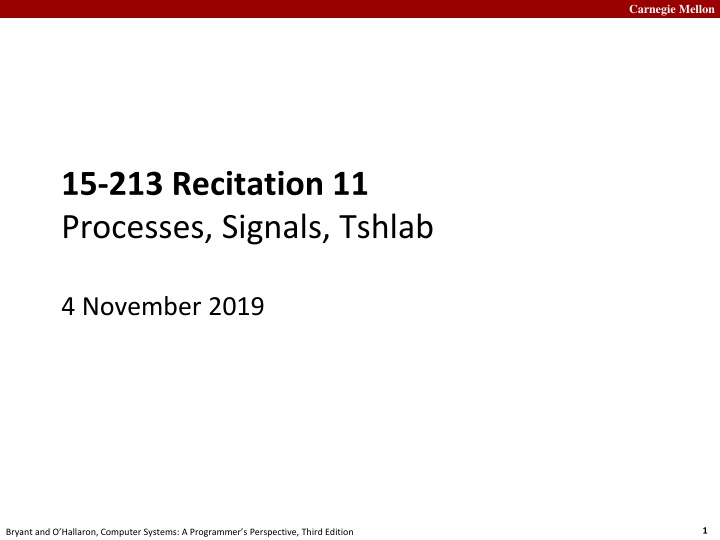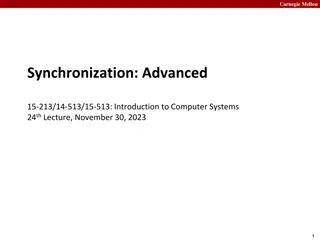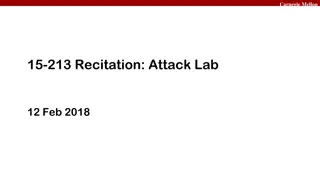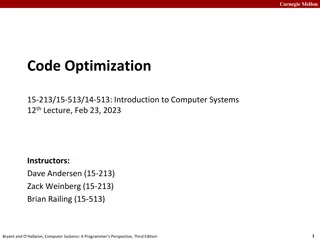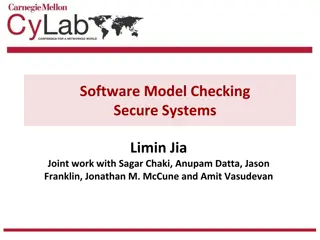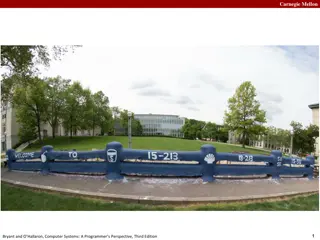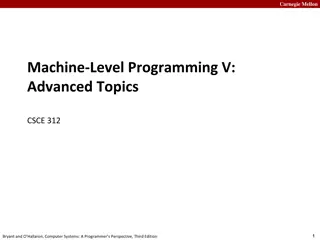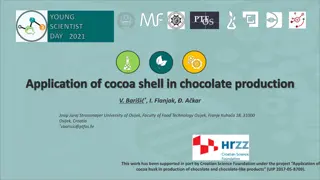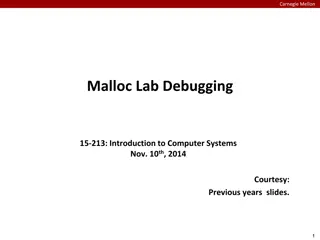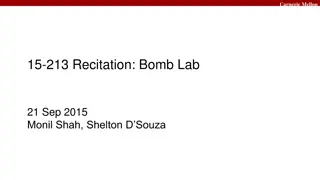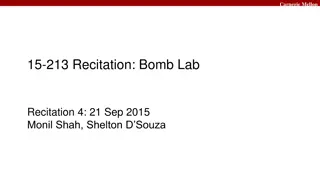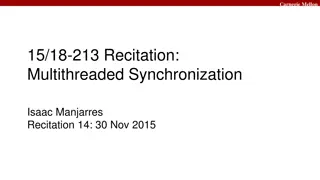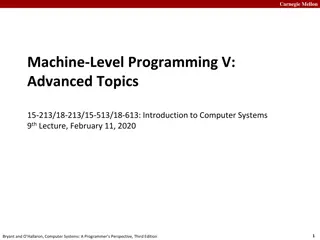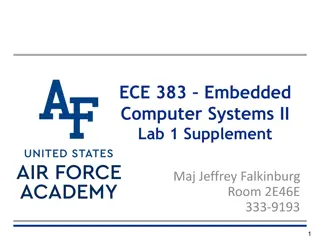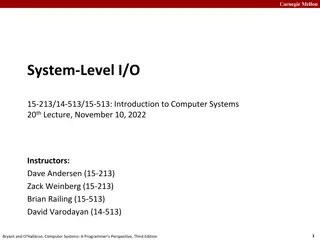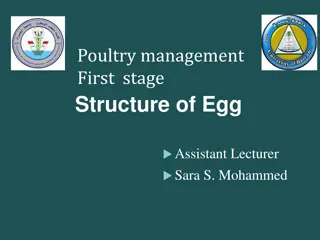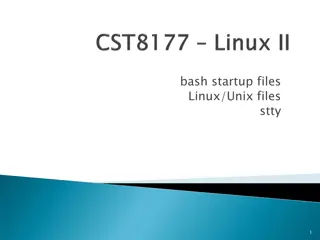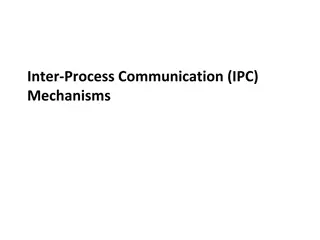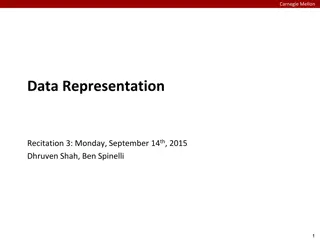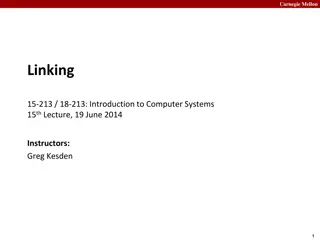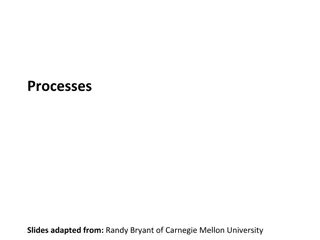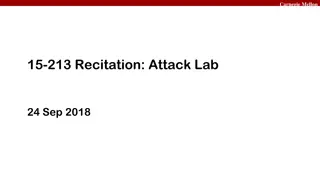Carnegie Mellon Computer Systems: Processes, Signals, and Shell Lab Overview
In this overview of Carnegie Mellon's Computer Systems course, key topics such as process lifecycle, error handling, signal handling, and shell lab assignments are discussed. The importance of understanding process creation, duplication, program replacement, and termination is highlighted. Students are advised to carefully review instructions, avoid race conditions, not blindly use textbook code, and pay attention to error handling in their shell implementations. The upcoming deadlines and scheduling details for assignments are emphasized.
Download Presentation

Please find below an Image/Link to download the presentation.
The content on the website is provided AS IS for your information and personal use only. It may not be sold, licensed, or shared on other websites without obtaining consent from the author.If you encounter any issues during the download, it is possible that the publisher has removed the file from their server.
You are allowed to download the files provided on this website for personal or commercial use, subject to the condition that they are used lawfully. All files are the property of their respective owners.
The content on the website is provided AS IS for your information and personal use only. It may not be sold, licensed, or shared on other websites without obtaining consent from the author.
E N D
Presentation Transcript
Carnegie Mellon 15-213 Recitation 11 Processes, Signals, Tshlab 4 November 2019 1 Bryant and O Hallaron, Computer Systems: A Programmer s Perspective, Third Edition
Carnegie Mellon Outline Logistics Process Lifecycle Error Handling Signal Handling 2 Bryant and O Hallaron, Computer Systems: A Programmer s Perspective, Third Edition
Carnegie Mellon Logistics Malloc Final due tomorrow (11/5) Can use up to 2 late days! Style grading mm.c (not checkheap) Midterm regrades released Review exam in Professor OH 3 Bryant and O Hallaron, Computer Systems: A Programmer s Perspective, Third Edition
Carnegie Mellon Shell Lab Due date: next Thursday (November 14th) Simulate a Linux-like shell with I/O redirection Review the writeup carefully. Review once before starting, and again when halfway through This will save you a lot of style points and a lot of grief! Read Chapter 8 in the textbook: Process lifecycle and signal handling How race conditions occur, and how to avoid them Be careful not to use code from the textbook without understanding it first. 4 Bryant and O Hallaron, Computer Systems: A Programmer s Perspective, Third Edition
Carnegie Mellon Process Lifecycle fork() Create a duplicate, a child , of the process execve() Replace the running program ... [Complete Work] exit() End the running program waitpid() Wait for a child process to terminate 5 Bryant and O Hallaron, Computer Systems: A Programmer s Perspective, Third Edition
Carnegie Mellon Notes on Examples Full source code of all programs is available TAs may demo specific programs In the following examples, exit() is called We do this to be explicit about the program s behavior Exit should generally be reserved for terminating on error Unless otherwise noted, assume all syscalls succeed Error checking code is omitted. Be careful to check errors when writing your own shell! 6 Bryant and O Hallaron, Computer Systems: A Programmer s Perspective, Third Edition
Carnegie Mellon Processes are separate How many lines are printed? If pid is at address 0x7fff2bcc264c, what is printed? int main(void) { pid_t pid; pid = fork(); printf("%p - %d\n", &pid, pid); exit(0); } 7 Bryant and O Hallaron, Computer Systems: A Programmer s Perspective, Third Edition
Carnegie Mellon Processes are separate How many lines are printed? If pid is at address 0x7fff2bcc264c, what is printed? int main(void) { pid_t pid; pid = fork(); printf("%p - %d\n", &pid, pid); exit(0); } 0x7fff2bcc264c - 24750 0x7fff2bcc264c - 0 The order and the child's PID (printed by the parent) may vary, but the address will be the same in the parent and child. 8 Bryant and O Hallaron, Computer Systems: A Programmer s Perspective, Third Edition
Carnegie Mellon Processes Change What does this program print? int main(void) { char *args[3] = { "/bin/echo", "Hi 18213!", NULL }; execv(args[0], args); printf("Hi 15213!\n"); exit(0); } 9 Bryant and O Hallaron, Computer Systems: A Programmer s Perspective, Third Edition
Carnegie Mellon Processes Change What does this program print? int main(void) { char *args[3] = { "/bin/echo", "Hi 18213!", NULL }; execv(args[0], args); printf("Hi 15213!\n"); exit(0); } Hi 18213! 10 Bryant and O Hallaron, Computer Systems: A Programmer s Perspective, Third Edition
Carnegie Mellon Processes Change What about this program? What does it print? int main(void) { char *args[3] = { "/bin/blahblah", "Hi 15513!", NULL }; execv(args[0], args); printf("Hi 14513!\n"); exit(0); } 11 Bryant and O Hallaron, Computer Systems: A Programmer s Perspective, Third Edition
Carnegie Mellon Processes Change What about this program? What does it print? int main(void) { char *args[3] = { "/bin/blahblah", "Hi 15513!", NULL }; execv(args[0], args); printf("Hi 14513!\n"); exit(0); } Hi 14513! 12 Bryant and O Hallaron, Computer Systems: A Programmer s Perspective, Third Edition
Carnegie Mellon On Error What should we do if malloc fails? const size_t HUGE = 1 * 1024 * 1024 * 1024; int main(void) { char *buf = malloc(HUGE * HUGE); printf("Buf at %p\n", buf); free(buf); exit(0); } 13 Bryant and O Hallaron, Computer Systems: A Programmer s Perspective, Third Edition
Carnegie Mellon On Error What should we do if malloc fails? const size_t HUGE = 1 * 1024 * 1024 * 1024; int main(void) { char *buf = malloc(HUGE * HUGE); if (buf == NULL) { fprintf(stderr, "Failure at %u\n", __LINE__); exit(1); } printf("Buf at %p\n", buf); free(buf); exit(0); } 14 Bryant and O Hallaron, Computer Systems: A Programmer s Perspective, Third Edition
Carnegie Mellon Exit values can convey information Two values are printed. Are they related? int main(void) { pid_t pid = fork(); if (pid == 0) { exit(getpid()); } else { int status = 0; waitpid(pid, &status, 0); printf("0x%x exited with 0x%x\n", pid, WEXITSTATUS(status)); } exit(0); } 15 Bryant and O Hallaron, Computer Systems: A Programmer s Perspective, Third Edition
Carnegie Mellon Exit values can convey information Two values are printed. Are they related? int main(void) { pid_t pid = fork(); if (pid == 0) { exit(getpid()); } else { int status = 0; waitpid(pid, &status, 0); printf("0x%x exited with 0x%x\n", pid, WEXITSTATUS(status)); } exit(0); } 0x7b54 exited with 0x54 They're the same!... almost. Exit codes are only one byte in size. 16 Bryant and O Hallaron, Computer Systems: A Programmer s Perspective, Third Edition
Carnegie Mellon Processes have ancestry What's wrong with this code? (assume that fork succeeds) int main(void) { int status = 0, ret = 0; pid_t pid = fork(); if (pid == 0) { pid = fork(); exit(getpid()); } ret = waitpid(-1, &status, 0); printf("Process %d exited with %d\n", ret, status); ret = waitpid(-1, &status, 0); printf("Process %d exited with %d\n", ret, status); exit(0); } 17 Bryant and O Hallaron, Computer Systems: A Programmer s Perspective, Third Edition
Carnegie Mellon Processes have ancestry What's wrong with this code? (assume that fork succeeds) int main(void) { int status = 0, ret = 0; pid_t pid = fork(); if (pid == 0) { pid = fork(); exit(getpid()); } waitpid will reap only children, not grandchildren, so the second waitpid call will return an error. ret = waitpid(-1, &status, 0); printf("Process %d exited with %d\n", ret, status); ret = waitpid(-1, &status, 0); printf("Process %d exited with %d\n", ret, status); exit(0); } 18 Bryant and O Hallaron, Computer Systems: A Programmer s Perspective, Third Edition
Carnegie Mellon Process Graphs How many different sequences can be printed? int main(void) { int status; if (fork() == 0) { pid_t pid = fork(); printf("Child: %d\n", getpid()); if (pid == 0) { exit(0); } // Continues execution... } pid_t pid = wait(&status); printf("Parent: %d\n", pid); exit(0); } 19 Bryant and O Hallaron, Computer Systems: A Programmer s Perspective, Third Edition
Carnegie Mellon Process Graphs How many different sequences can be printed? int main(void) { int status; if (fork() == 0) { pid_t pid = fork(); printf("Child: %d\n", getpid()); if (pid == 0) { exit(0); } // Continues execution... } pid_t pid = wait(&status); printf("Parent: %d\n", pid); exit(0); } fork wait print exit print wait print fork exit print exit 20 Bryant and O Hallaron, Computer Systems: A Programmer s Perspective, Third Edition
Carnegie Mellon Process Graphs How many different lines are printed? int main(void) { char *tgt = "child"; pid_t pid = fork(); if (pid == 0) { pid = getppid(); // Get parent pid tgt = "parent"; } kill(pid, SIGKILL); printf("Sent SIGKILL to %s:%d\n", tgt, pid); exit(0); } 21 Bryant and O Hallaron, Computer Systems: A Programmer s Perspective, Third Edition
Carnegie Mellon Process Graphs How many different lines are printed? int main(void) { char *tgt = "child"; pid_t pid = fork(); if (pid == 0) { pid = getppid(); // Get parent pid tgt = "parent"; } kill(pid, SIGKILL); printf("Sent SIGKILL to %s:%d\n", tgt, pid); exit(0); } Anywhere from 0-2 lines. The parent and child try to terminate each other. 22 Bryant and O Hallaron, Computer Systems: A Programmer s Perspective, Third Edition
Carnegie Mellon Signals and Handling Signals can happen at any time Control when through blocking signals Signals also communicate that events have occurred What event(s) correspond to each signal? Write separate routines for receiving (i.e., signals) 23 Bryant and O Hallaron, Computer Systems: A Programmer s Perspective, Third Edition
Carnegie Mellon Counting with signals Will this code terminate? volatile int counter = 0; void handler(int sig) { counter++; } int main(void) { signal(SIGCHLD, handler); for (int i = 0; i < 10; i++) { if (fork() == 0) { exit(0); } } while (counter < 10) { mine_bitcoin(); } return 0; } 24 Bryant and O Hallaron, Computer Systems: A Programmer s Perspective, Third Edition
Carnegie Mellon Counting with signals Will this code terminate? volatile int counter = 0; void handler(int sig) { counter++; } int main(void) { signal(SIGCHLD, handler); for (int i = 0; i < 10; i++) { if (fork() == 0) { exit(0); } } while (counter < 10) { mine_bitcoin(); } return 0; } (Don't busy-wait, use sigsuspend instead!) (Don't use signal, use Signal or sigaction instead!) It might not, since signals can coalesce. 25 Bryant and O Hallaron, Computer Systems: A Programmer s Perspective, Third Edition
Carnegie Mellon Proper signal handling How can we fix the previous code? Remember that signals will be coalesced, so the number of times a signal handler has executed is not necessarily the same as number of times a signal was sent. We need some other way to count the number of children. 26 Bryant and O Hallaron, Computer Systems: A Programmer s Perspective, Third Edition
Carnegie Mellon Proper signal handling How can we fix the previous code? Remember that signals will be coalesced, so the number of times a signal handler has executed is not necessarily the same as number of times a signal was sent. We need some other way to count the number of children. void handler(int sig) { pid_t pid; while ((pid = waitpid(-1, NULL, WNOHANG)) > 0) { counter++; } } (This instruction isn't atomic. Why won't there be a race condition?) 27 Bryant and O Hallaron, Computer Systems: A Programmer s Perspective, Third Edition
Carnegie Mellon Error in UNIX - return value int main() { int fd = open("213Grades.txt", Can System call fail ? How to tell the difference ? O_RDWR); // Change grades to As or Fs } 28 28 Bryant and O Hallaron, Computer Systems: A Programmer s Perspective, Third Edition
Carnegie Mellon Error in UNIX - What error ? int main() { int fd = open("213Grades.txt", Can System call fail ? How to tell the difference ? Returned -1 O_RDWR); if (fd < 0) { printf("Failed\n"); exit(-1); } // Change grades to As or Fs So, my fantastic system call failed. How can I tell what got wrong ? } 29 29 Bryant and O Hallaron, Computer Systems: A Programmer s Perspective, Third Edition
Carnegie Mellon Error handling - What now ? int main() { while (!quit) { int fd = open(userfile,O_RDWR); if (fd < 0) { printf("Failed\n"); perror("open"); // use errno exit(-1); } } } Can System call fail ? How to tell the difference ? Returned -1 So, my fantastic system call failed. How can I tell what got wrong ? The error is in errno (global) (only if the syscall fail, what do you get on success ?) What do I do ? 30 30 Bryant and O Hallaron, Computer Systems: A Programmer s Perspective, Third Edition
Carnegie Mellon int main() { while (!quit) { int fd = open(userfile,O_RDWR); if (fd < 0) { if (errno == EACCESS) { // tell user he s wrong continue; } else if( ) { } else { perror("open"); // use errno exit(-1); } } } } Error and signals Can System call fail ? How to tell the difference ? Returned -1 So, my fantastic system call failed. How can I tell what got wrong ? The error is in errno (a global) If success errno may contain anything What do I do ? Look at errno and take action Hey, here comes a signal 31 31 Bryant and O Hallaron, Computer Systems: A Programmer s Perspective, Third Edition
Carnegie Mellon Error and signals : Recap You can t expect people to block signals around all error handling logic Hence, your signal handler shouldn t interfere with them Solution : Do not make any system call that could set errno Save and restore errno (store at beginning of handler and restore after) 32 32 Bryant and O Hallaron, Computer Systems: A Programmer s Perspective, Third Edition
Carnegie Mellon Example Question What are all possible output values? int main( ) { int val = 2; printf("%d", 0); fflush(stdout); if (fork( ) == 0) { val++; printf("%d", val); fflush(stdout); } else { val--; printf("%d", val); fflush(stdout); wait(NULL); } val++; printf("%d", val); fflush(stdout); exit(0); 33 Bryant and O Hallaron, Computer Systems: A Programmer s Perspective, Third Edition }
Carnegie Mellon If you get stuck Read the writeup! Do manual unit testing before runtrace and sdriver! Read the writeup! Post private questions on Piazza! Think carefully about error conditions. Read the man pages for each syscall when in doubt. What errors can each syscall return? How should the errors be handled? 34 Bryant and O Hallaron, Computer Systems: A Programmer s Perspective, Third Edition
Carnegie Mellon Appendix: Blocking signals Surround blocks of code with calls to sigprocmask. Use SIG_BLOCK to block signals at the start. Use SIG_SETMASK to restore the previous signal mask at the end. Don't use SIG_UNBLOCK. We don't want to unblock a signal if it was already blocked. This allows us to nest this procedure multiple times. sigset_t mask, prev; sigemptyset(&mask, SIGINT); sigaddset(&mask, SIGINT); sigprocmask(SIG_BLOCK, &mask, &prev); // ... sigprocmask(SIG_SETMASK, &prev, NULL); 35 Bryant and O Hallaron, Computer Systems: A Programmer s Perspective, Third Edition
Carnegie Mellon Appendix: Errno #include <errno.h> Global integer variable used to store an error code. Its value is set when a system call fails. Only examine its value when the system call's return code indicates that an error has occurred! Be careful not to call make other system calls before checking the value of errno! Lets you know why a system call failed. Use functions like strerror, perror to get error messages. Example: assume there is no foo.txt in our path int fd = open("foo.txt", O_RDONLY); if (fd < 0) perror("open"); // open: No such file or directory 36 Bryant and O Hallaron, Computer Systems: A Programmer s Perspective, Third Edition
Carnegie Mellon Appendix: Writing signal handlers G1. Call only async-signal-safe functions in your handlers. Do not call printf, sprintf, malloc, exit! Doing so can cause deadlocks, since these functions may require global locks. We've provided you with sio_printf which you can use instead. G2. Save and restore errno on entry and exit. If not, the signal handler can corrupt code that tries to read errno. The driver will print a warning if errno is corrupted. G3. Temporarily block signals to protect shared data. This will prevent race conditions when writing to shared data. Avoid the use of global variables in tshlab. They are a source of pernicious race conditions! You do not need to declare any global variables to complete tshlab. Use the functions provided by tsh_helper. 37 Bryant and O Hallaron, Computer Systems: A Programmer s Perspective, Third Edition
